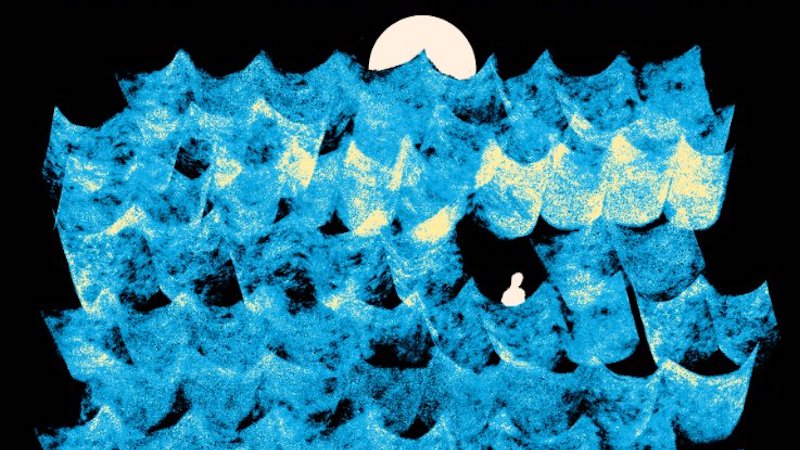
Our hillock of high-quality reviews this week includes Alex Shephard on Jake Tapper and Alex Thompson’s Original Sin, Jessi Jezewska Stevens on Yiyun Li’s Things in Nature Merely Grow, Jonathan Russell Clark on Alex Foster’s Circular Motion, Xan Brooks on Madeleine Thein’s The Book of Records, and Clea Simon on Robert Macfarlane’s Is a River Alive?.

“The result of more than 200 interviews, the book is a damning account of an elderly, egotistical president shielded from reality by a slavish coterie of loyalists and family members united by a shared, seemingly ironclad sense of denial and a determination to smear anyone who dared to question the president’s fitness for office as a threat to the republic covertly working on behalf of Trump. For years, they denied the president had any issues and kept him away from a public that had long since concluded that he was too old for the job. It worked for an astonishingly long time, until, very suddenly, it didn’t.
Of the many virtues of Original Sin, the greatest is its stubborn focus on Biden’s health as not just the most important factor in the 2024 election but the sole defining reason for Trump’s victory … Original Sin is not really a ‘campaign book’—its account of the 2024 election largely ends after Biden drops out—but its simple assessment of the race is more compelling than anything else I’ve read about it .
…
“Original Sin is rarely better than when Tapper and Thompson are writing—with extensive reporting and clear-eyed prose—about the disaster that Biden caused … Over the next year, dozens of books will appear that attempt to explain this election. It’s hard to imagine any doing better than that.”
–Alex Shephard on Jake Tapper and Alex Thompson’s Original Sin: President Biden’s Decline, Its Cover-Up, and His Disastrous Choice to Run Again (The Washington Post)
“Grief memoirs claim special license to lamenting the medium in which they must proceed. ‘This is a case in which I need more than words to find the meaning,’ Joan Didion wrote in The Year of Magical Thinking (2005), the contemporary paradigm for the genre. In Sloane Crosley’s recent Grief Is for People (2024), the author likewise finds language a paltry companion in the void: ‘I am disgusted by the universal truths of grief, by the platitudes.’ Grief is shatteringly specific. Language threatens its reduction to cliché. Things in Nature Merely Grow…is not a grief memoir, but a book of ‘facts and logic, written from a particularly abysmal place where no parent would want to be.’
…
“Things in Nature is a book of facts and logic because it is an attempt to memorialize James on his own terms, as he would have liked, through ‘thinking rather than feeling.’ As in a mathematical proof, Li begins with first premises: she will proceed from a place of ‘radical acceptance’ some won’t be able to stomach. She advises such readers to set this book—and, by corollary, this review—aside. For the facts to be faced are frankly unimaginable.
…
“Imposing narrative resolution onto a story with none comes, furthermore, at too high a moral cost. ‘Not calling a fact by its name can be the beginning of cruelty and injustice,’ Li writes. It is a profound reprimand to readers who seek softer telling—or, worse, blame. The unique value of this memoir is the invitation to reflect on how those of us outside the abyss treat others in the midst of great loss. For this careful, precise, and descriptive book is laced with anger toward the public response.
…
“Li, as she confessed to James, did not understand the Tractatus. She was not that ‘one person’ whom it addressed. And yet, however challenging it was to read, it enriched her imagination for life. One feels the same about her steely, heartbreaking, deeply moral tribute to her remarkable son.’
–Jessi Jezewska Stevens on Yiyun Li’s Things in Nature Merely Grow (4Columns)
“…if this makes it sound as if Circular Motion operates only as a lofty, idea-driven, futuristic meditation on technology, rest assured that what ultimately recommends Foster’s novel are its most terrestrial elements — the characters. As Tanner adjusts to life in London, where his job with CWC eventually takes him, he begins a relationship with Miguel. It’s Tanner’s first romantic and sexual experience, a bumpy and vulnerable rite for anyone, made more so in this case by the prejudice of Tanner’s domineering, off-the-grid father. Tanner and Miguel’s romance is rendered much more delicately and humanely than many near-future dystopian novels might have handled it. Such care in characterization keeps Circular Motion grounded, so that its more daring narrative leaps have something anchoring them and don’t fly off into the sky.
…
“Foster has a knack for delicately balancing the emotional stakes for these deeply drawn characters with the dispensing, at a breakneck pace, of a great deal of information, exposition and global developments … All developments are skillfully constructed, evolve organically from where they start and grow more interesting than those starting points—in the same way that the Shell, the protective layer built around Earth, is an ingenious, natural and even more fascinating concept than the clever one that initiated it, the acceleration of the planet’s rotation. Foster doesn’t rest on his fun and original ideas; he nurtures them, cultivates them with thoughtful challenges and unexpected turns, until out of them emerge new ideas, complicated and earned.
With shades of emotional planetary disaster novels like Karen Thompson Walker’s The Age of Miracles and politically charged climate fiction like Stephen Markley’s The Deluge, Circular Motion comes from a writer capable of two things often misconstrued as counter to each other: deep, rich characters and elaborate, challenging ideas. The people give credence to the imaginative story, and the story creates stakes for the people. The corporate causes of climate change, as well as our complicity in their corruption, might very well bring about the end of human civilization, but it will be a slow death, a whimper. Circular Motion, literally and figuratively, speeds things up to spotlight our folly. A quicker death for the world, though, may be Foster’s most sympathetic fictional act.”
–Jonathan Russell Clark on Alex Foster’s Circular Motion (The Washington Post)
“The sea takes many forms in fiction. It was an adventure playground in Robert Louis Stevenson’s Treasure Island and a rowdy neighbour in Daphne du Maurier’s Jamaica Inn. It played the wine-dark seducer in Homer’s Odyssey and the snot-green tormentor in Joyce’s Ulysses. But while its colour can change and its humour may vary, its fictional properties remain reassuringly stable. The sea is our unconscious, a repository of memory, the beginning and end of all things. It’s what Jules Verne described as the ‘Living Infinite.’ In Madeleine Thien’s rapturous fourth novel, The Book of Records, ‘the Sea’ is the name given to a gargantuan migrant compound, sprawled on the shoreline a decade or two in the future.
…
“Naturally this near-future migrant fable is also by extension a novel of ideas. It’s about the ways in which experience and knowledge are handed down or slip free, to the point where we inherit and inhabit the lives of those who have gone before. Wui Shin once worked as a ‘cyberspace engineer’ for a state-controlled tech firm, restricting access to the Chinese internet. His daughter’s story, though, plays out as an unfettered open inquiry, cross-referencing the laws of physics with the writings of Kafka, Proust and Italo Calvino. Thien–who was born in Canada to Chinese parents–is fascinated by the relationship of memory to history and by the cross-pollination of separate cultures and writers. Intriguingly, her 2016 Booker-shortlisted novel Do Not Say We Have Nothing contains a close cousin of Lina’s Great Lives series: the fragment from a book of historical records which has been copied by hand and smuggled out of China. The Sea recycles its wares, just as novelists do. Each standalone story is like a beaker dipped and drawn from a wider body of work.
…
“The Book of Records is a rich and beautiful novel. It’s serious but playful; a study of limbo and stasis that nonetheless speaks of great movement and change. If this turbulent, mercurial tale has an anchor, it is its belief that ‘in order to extend life and preserve civilisation, we are obliged to rescue one another.’ Thien explains in the acknowledgments that she has lifted this quote from The Book of Mountains and Rivers, a 2012 essay collection by the Chinese writer Yu Qiuyu. She hands it on from Arendt to Blucher to Lina in the Sea, as though it’s a baton or a lifeline that connects all the world’s great voyagers.”
–Xan Brooks on Madeleine Thein’s The Book of Records (The Guardian)
“Should a natural feature—a function of the earth—have the same rights as a human, or, really, any sentient creature? That is the question at the heart of Is a River Alive?, Robert Macfarlane’s exhaustive—and at times exhausting—new book. Considering the author’s background as a nature writer, it is clear the answer he expects is ‘yes,’ and after reading this multifaceted argument, it is hard to disagree.
At once a scholarly treatise and a poetic memoir, Is a River Alive? is a work of radical environmentalism, a book that treats hydroelectric power as an enemy and Ecuador (among other less-developed nations) as a trailblazer. It is also a compelling, if occasionally maddening, read, veering from gorgeous, almost hallucinatory writing into overeffusiveness before Macfarlane pulls it all together in a final breathtaking swoop.
…
“Although it may be the logical next step, the author takes a greater leap in his choice to use anthropomorphic grammar. Instead of saying, for example ‘a river that flows,’ he writes, ‘I prefer to speak of rivers who flow,’ treating rivers and other bodies of water as if they were people. Macfarlane’s smooth prose doesn’t often rely on this construction, but it is jarring at first. For readers who accept the conceit of the book, however, it is part of the package, and this grammatical anomaly, initially off-putting as it may be, becomes as smooth as a river stone over time, in part through usage and in part thanks to Macfarlane’s copious quotations from indigenous sources who do the same.
…
“But it is the author’s language that takes the biggest leaps. Macfarlane is a lyrical writer, his prose packed with alliteration and imagery, much of it connected to rivers and water. But while the overall effect is hypnotic, at times his metaphors are strained … However, for all these missteps, this is a profoundly beautiful and moving work.”
–Clea Simon on Robert Macfarlane’s Is a River Alive? (The Boston Globe)
If you buy books linked on our site, Lit Hub may earn a commission from Bookshop.org, whose fees support independent bookstores.

